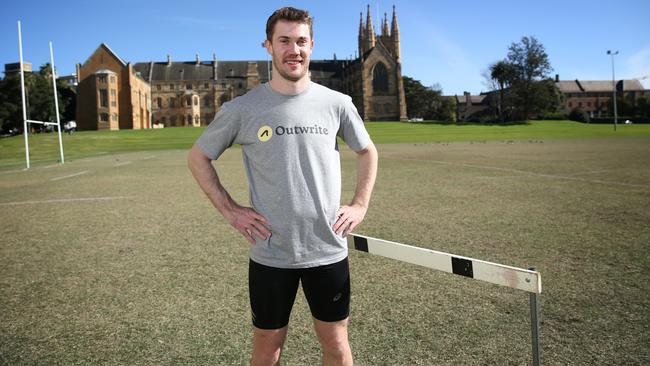Covid-19 just another hurdle for Olympic hopeful Nick Hough
Covid-19 has delayed the Tokyo Olympics but accelerated the growth of the business co-founded by the 110m hurdler.

Even if it wasn’t the dream come true of an Olympic medal, Nick Hough quietly and impressively racked up a couple of significant milestones this week.
On Tuesday, the day the 110m hurdler would have been running in heats in Tokyo before the COVID-19 pandemic delayed the 2020 Olympic Games, Hough recorded his best ever time while training at the University of Sydney.
But Hough prefers to talk about another feat, the one million user mark his software start-up business has just hit — a global business he has helped build while pursuing his Olympic dream and even worked on while winning bronze at the 2018 Commonwealth Games.
At 26, Hough is also the chief executive and co-founder of Outwrite, an artificial intelligence-powered software firm he co-founded with one-time university classmate Craig Sketchley.
If that sounds familiar, it is because it is a similar path to that of Atlassian billionaire co-founders Mike Cannon-Brookes and Scott Farquhar, who famously met while studying at the University of NSW and went on to build a global software powerhouse.
Hough is not in that league yet businesswise, but he has ambitions and says running the start-up has helped take his mind off having Tokyo delayed for a year and not being able to head overseas for the traditional European summer running season.
“While the shutdown hasn’t been great for my Olympic aspirations, ironically it has been good for the business. We were not expecting to hit one million customers until later in the year, so it has certainly accelerated that,” he told The Weekend Australian from Outwrite’s Sydney CBD office this week before heading to training.
Outwrite acts as a proofreading service for customers such as university students writing assignments or a thesis or professionals putting together documents for corporate websites, presentations or even emails and blogs.
The AI software Hough and Sketchley wrote while they were at university each completing an honours thesis in machine learning and natural language analysis has evolved into software-as-a-service that reads sentences and suggests improvements, spelling corrections, sentence paraphrasing and also checks for plagiarism.
“You can imagine that someone studying computer science, writing is not the most natural thing for us. We decided instead of learning how to write well we’d invent a piece of software that did it for us,” Hough says.
About 80 per cent of customers are in the US, using the plug-ins Hough’s business has developed for Google Docs and Word and other software, and Hough says the business has been profitable for the past couple of years and growth during COVID has allowed it to employ nine full-time staff.
So does Hough see himself as an entrepreneur or athlete? The answer is a mixture of both, but he admits he has copped the question in both the business and sporting worlds.
“The good thing is that I’m a sprinter and rest is good for me, so I don’t need to be training 10 hours a day. I do usually train every day, whether it is at the gym or the track. But the good thing is I can do it whenever I want. I can come into the office, leave at lunchtime and do a gym session. There’s not that reason to be in the office 9 to 5.
“But yes, I’ve got that question a lot — from both sides. I’ve talked to investors and they’ve said, ‘well is this Olympic thing going to distract you’, and then the same thing with sporting administrators who think all you have to do is train. But what am I going to do with the other 10 hours of the day?”
The points system needed for Olympic qualification in his event had Hough travelling overseas to compete, usually in Europe, before the pandemic.
Being stuck in Australia for now has its silver linings for being closer to the business, and in sporting terms Hough says he thinks he will have enough points to qualify for Tokyo next year anyway.
Hough won bronze on the Gold Coast at the 2018 Commonwealth Games, even if he clipped several hurdles on the way to a then personal-best time of 13.38 seconds to be the first Australian male to win a medal in the event in 20 years.
The extra time in Sydney has given him scope to improve his technique and led to his strong training performances this week. “My coach said that’s the fastest you’ve ever run. I said, ‘oh that’s good’, but I’d rather have done it in Tokyo rather than in Sydney in the middle of winter, but that’s just how it is.”
But Outwrite has also helped him stay in athletics. Hough said he had earned nothing as a runner, despite being a medallist. He has ambitions to keep running until at least the 2024 Games in Paris, and his business will hopefully help pay his way.
“I still have no sponsors ... I guess you can say in a way that my business is now sponsoring my athletic endeavours. I don’t do the sport for the money, because there’s none in it.”




To join the conversation, please log in. Don't have an account? Register
Join the conversation, you are commenting as Logout